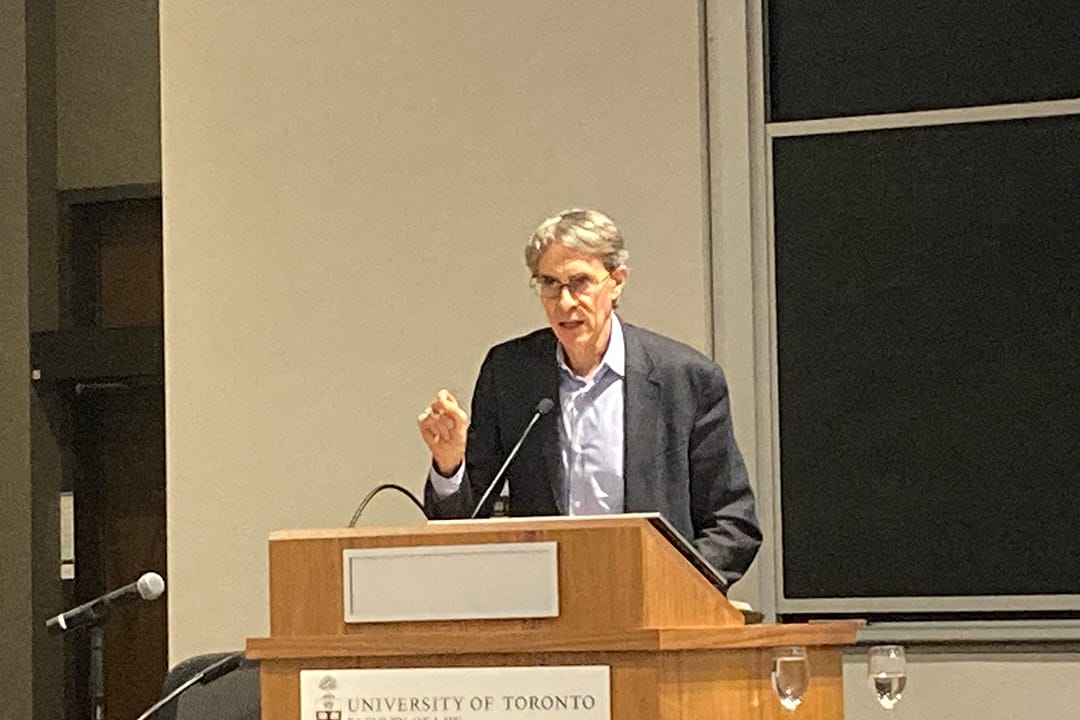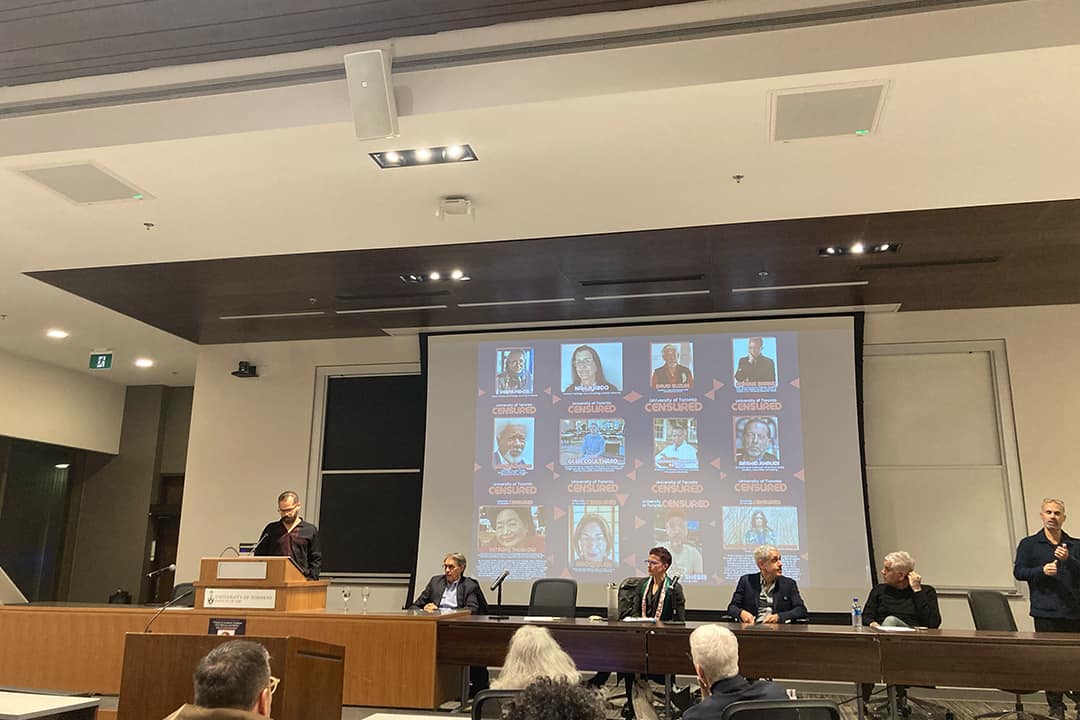Many students and advocacy groups have called on the university to express stances on world issues, from the violence in Gaza and Israel to the war in Sudan. But should universities be weighing in on global affairs?
According to former Human Rights Watch (HRW) Director Kenneth Roth, the answer is no. In a November 16 lecture hosted by CensureUofT — a faculty group that advocates against donor interference and the suppression of speech on Palestine — Roth argued that universities should generally protect and promote an expansive right to freedom of speech but avoid commenting on issues themselves, arguing that statements on world affairs invite donor interference.
Roth prescribed systematic changes to how universities approach free speech, touching on issues such as international student funding, boycotts, convocation speakers, whether speech can constitute violence, and more.
CensureUofT and the annual lecture
Faculty members originally formed CensureUofT during the Azarova scandal, which erupted in 2020 when the Faculty of Law allegedly rescinded a job offer to human rights lawyer Valentina Azarova after a donor complained about her writings discussing Israeli settlers’ occupation of the Palestinian territories. At the time, the Canadian Association of University Teachers (CAUT) officially censured U of T, instructing its members — more than 72,000 teachers, researchers, librarians, and staff across Canadian public universities — to avoid accepting speaking invitations at or appointments to the university. CensureUofT advocated for the censure, which CAUT lifted in November 2021 after U of T reoffered the position to Azarova.
Around 6:00 pm on November 16, approximately 180 people settled into the Faculty of Law Rosalie Silberman Abella Moot Court Room for CensureUofT’s second annual lecture.
In their opening remarks, Geography and Planning Professor Deborah Cowen noted that the U of T community must remain vigilant about combatting donors’ influence over the university, citing another scandal revealed this year involving Amazon’s donations to U of T. They told the audience, “We’re never about all agreeing on all the answers, but [we can agree] about sharing in a firm commitment to challenging the Palestine exception to academic freedom and to refusing donor and executive power.”
Kenneth Roth — who served for almost 30 years as executive director of HRW — began by discussing his experience as the subject of another hiring scandal, when Dean Douglas Elmendorf of the Harvard Kennedy School vetoed a fellowship offer to Roth earlier this year. A Harvard professor told The Nation that Elmendorf had attributed his decision to HRW’s “anti-Israel bias,” and Roth publicly accused Elmendorf of appearing to cater to donors to Harvard who were proponents of Israel. After public pressure from students, professors, and human rights groups, Elmendorf reversed course and offered the position to Roth. Elmendorf claims that donors did not influence the original decision to block Roth’s appointment.
Roth acknowledged that the case had a positive outcome but noted that most people facing “censorship” do not possess the same kind of leverage or media connections he had to fight back. Even then, Roth said, at one point, he asked Harvard to release a statement affirming students’ rights to free speech on Palestine and Israel, and the Harvard administration refused. “If anybody was able to stand up to donor pressure, it would be the wealthiest academic institution in the world. And they just would not stand up for principle,” he said.
Why universities shouldn’t comment on world affairs
Roth then discussed the pressures universities face from donors to comment in a particular way on world affairs. “I have come to the conclusion that it’s in significant part the fault of university leaders themselves that they are facing these kinds of pressures… because they have gotten themselves into the business of commenting on the world,” he said.
Although Roth acknowledged that these statements likely grew out of a desire to show concern for students’ well-being, donors often view themselves as entitled to shape universities’ public statements. He argued for a position popularized in the 1967 Kalven report produced by a University of Chicago committee, saying that universities should avoid commenting on world issues themselves. According to Roth, universities can best continue to address “burning issues” by promoting their faculty’s and students’ speech.
Roth also argued that universities cannot sufficiently uphold students’ and faculty members’ free speech if they themselves weigh in on global events. “It’s only a short step from [donors] saying ‘we want to influence your statement about the world’ to ‘we want to influence what statements happen on campus,’” he said.
Roth suggested that to allow student and faculty autonomy, universities should put up official statements clarifying that community members’ statements do not represent the stance of the university. He stated that universities should maintain a focus on community members’ mental health by regularly sending out messages reminding students of the resources available to them.
In terms of what speech universities should protect, Roth took an expansive view. He advocated against the view that speech could constitute violence, saying that he believed only physical violence could be labelled as ‘violence.’ He told the audience that universities and individuals shouldn’t advocate for limiting free speech merely to avoid listeners’ discomfort.
“My fear is that if universities begin to regularly indulge in this sense of discomfort as a reason to suppress speech, they are going to stop doing their jobs,” he said. “We shouldn’t pander to students by pretending that the issues they’re going to face are always going to be palatable… because they’re not.”
U of T did not directly respond to The Varsity’s questions about how it determines what issues to comment on and how it crafts its public statements. Instead, a U of T spokesperson highlighted U of T’s Provostial Guidelines on Donations, which states that the university will avoid taking donations that compromise its commitment to “integrity, autonomy, and academic freedom.” U of T raised $256 million in pledges and gifts between May 1, 2022 and April 30, 2023 — approximately eight per cent of its total operating revenue over the same period.
Government pressures and other puzzles
Roth discussed another source of pressure restricting academic freedom on campus: governments. He noted that universities’ increased financial reliance on tuition from international students, particularly those from China, might limit academic inquiry on issues that could damage those governments’ images. In particular, he claimed, universities reliant on tuition from Chinese international students “have become hypersensitive about criticism of China that might emerge from their campus that Beijing might use to stop those students from coming.”
A March 2020 report by international human rights organization Amnesty International condemned the Chinese government for harassing activists with ties to China or Hong Kong in Canadian universities who raised concerns about its human rights practices.
Roth argued that universities should try to diversify their funding sources, build up reserve funds, and recruit students from various countries to avoid reliance on tuition fees from any one country in particular.
In 2019, the funding U of T received from international students’ tuition surpassed what it received from either domestic students or government grants. As government funding has stagnated and the provincial government has capped domestic student tuition, the university’s reliance on international student tuition has grown. During a 2021 Governing Council meeting, then-Executive Director of Institutional Planning and Budget Administration Jeff Lennon estimated that one-fourth of U of T’s entire operating budget comes from Chinese international students’ tuition.
When The Varsity asked U of T whether the university considered free speech repercussions when planning the recruitment of international students, the university did not directly address the question but instead pointed to U of T’s 2022–2023 Enrolment Report, which says that the university is “committed to diversifying its international enrolment.”
Roth brought up other free speech issues universities might face, such as protests against speakers delivering lectures on campus. He argued that universities should allow people to protest peacefully but should ensure that speakers can exercise their right to speech.
Roth noted that a university’s choice of convocation speaker might imply the institution takes certain viewpoints, so he advocated for universities to outsource decisions on convocation speakers to faculty or student committees. At U of T, community members can nominate convocation speakers, and a committee — which includes the university president, teaching and administrative staff, and students — then makes a final recommendation to the governing council.
Reactions from attendees
During the question and answer period, multiple attendees pushed back against Roth’s position, which one attendee described as “free speech maximalist.”
One attendee discussed how universities may undermine people who exercise their academic freedom if they are not held to public commitments. “These statements are not platitudes,” said the attendee. “They are a commitment to the vulnerable, and without them, the university administration will act in very nefarious ways.”
In response, Roth implored the audience to consider what happens when university administrations take stances: “It is not the progressive positions that prevail once donors get in,” he argued.
Amira Dirie — an attendee and second-year master’s student at the Ontario Institute for the Study of Education — wrote in an email to The Varsity that she appreciated Roth’s contributions. She agreed about the importance of not conflating discomfort with a lack of safety. Still, she wished that Roth “left room for the nuance of what is considered harmful/hateful speech versus what level of speech is necessary to propel discourse.”
At the event, some attendees also asked Roth whether he thought universities should or should not boycott Israeli businesses or universities. Roth said that universities, like all businesses, have obligations to avoid “complicity in human rights violations” by divesting from companies that violate human rights.
However, he advocated against boycotting Israeli universities, distinguishing between governments and the people. “You gotta look to the people as potential allies to change the government because that’s foremost why governments change — because they’re getting domestic pressure.”
Roth ended by telling the crowd that he sees a “big role” for students in encouraging free speech. He urged them to avoid calling for university statements and to fight donors’ and governments’ efforts to encourage official stances from administrators on world issues.




No comments to display.